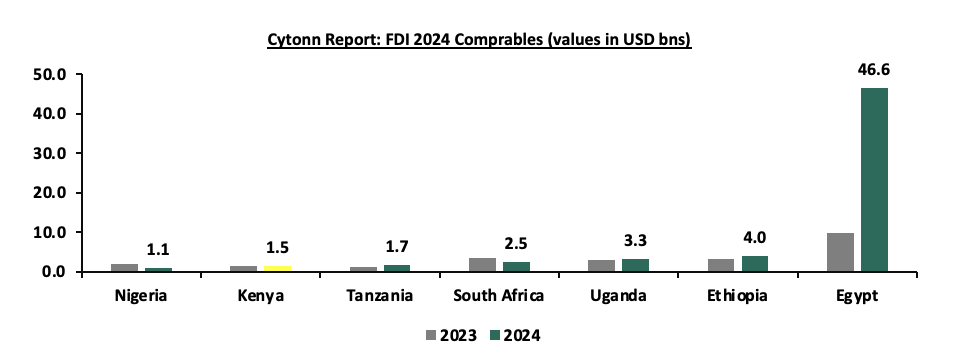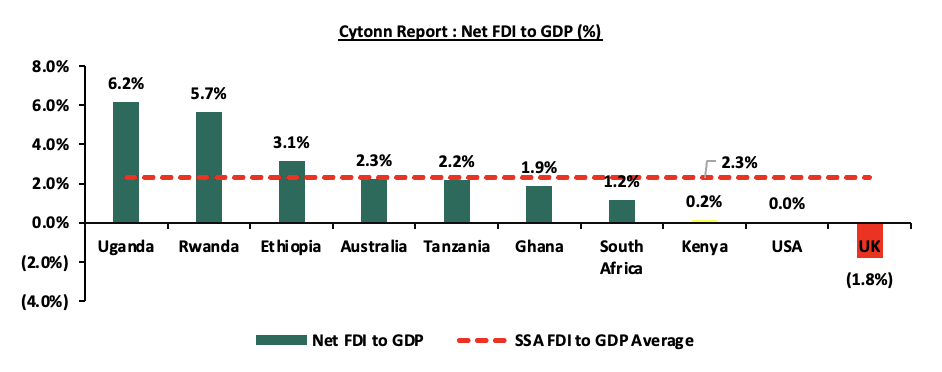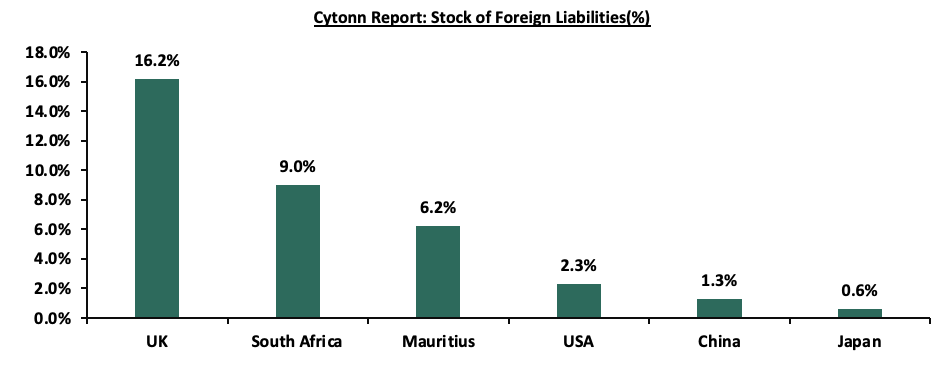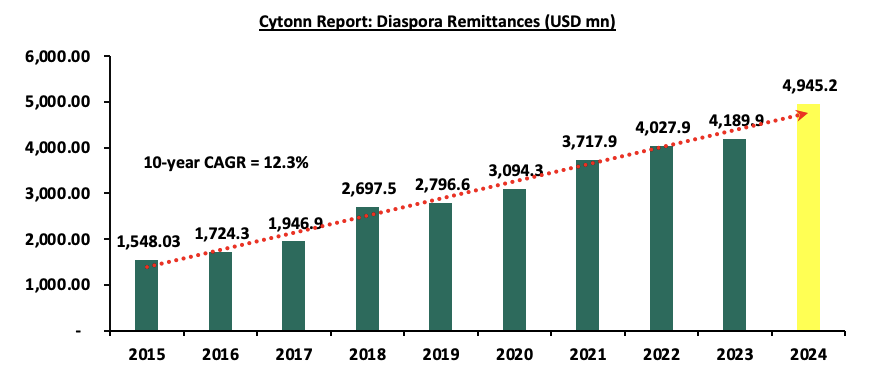Foreign Direct Investments (FDIs) refer to investments made by a firm or individual in one country into business interests located in another country. Generally, FDI takes place when an investor establishes foreign business operations or acquires foreign business assets, including establishing ownership or controlling interest in a foreign company. FDIs are crucial for economic growth as they not only bring investment capital but also facilitate technology transfer, management skills, and international trade integration, which can lead to higher productivity, employment, and economic stability in the host country.
Kenya’s FDI inflows decreased by marginally 0.1% to USD 1,503.0 mn in 2024 from USD 1,504.0 mn in 2023 and the country has been experiencing dwindling FDIs amongst her peers, hence our interest into delving in this topical. We shall do an in-depth analysis of the historical trend of FDIs in the country, compare it to other developed and peer economies, as well as give actionable initiatives to improve FDIs into the country. We shall cover the following:
- Overview of Foreign Direct Investments in Kenya,
- Economic Benefits of FDIs and Challenges to FDI Growth in Kenya,
- Recommendations, and,
- Conclusion and our Outlook.
Section I: Overview of Foreign Direct Investments in Kenya
According to the United Nations Conference on Trade and Development (UNCTAD) World Investments Report 2025, global Foreign Direct Investments (FDIs) inflows increased marginally by 3.7% in 2024 to USD 1.45 tn, from USD 1.51 tn in 2023. However, the growth was magnified by volatility in European economies that act as investments conduits. As such the global FDIs inflows declined by 12.1% to USD 1.5 tn in 2024 , from USD 1.7 tn in 2023 marking the second consecutive year a double-digit contraction has been recorded when volatile financial flow are excluded. The slowdown was mainly on the back of the Ukrainian war, high food and energy prices, as well as debt pressures due to uncertainty about exchange and interest rates levels. On the contrary, Foreign Direct Investment (FDI) inflows in Kenya recorded a marginal decline, having declined by 0.1% to estimate of USD 1,503.0 mn in 2024 from USD 1,504.0 mn in 2023. The chart below shows Kenya’s FDI inflows growth rate from 2018 to 2024:

Source: UNCTAD
The slight improvement on the decline registered year-on-year was mainly attributable to a range of policy interventions to mobilize resources and investments within the renewable energy sector. FDIs into the country have decreased over the years, recording a 5-year CAGR of (0.1%) to USD 1,503.0 mn in 2024, from USD 1,510.0 mn in 2020. The chart below shows the movement in Kenya’s FDI inflows over the years;

Source: UNCTAD
Kenya still lags behind its peers in terms of its ability to attract foreign investors to the country due to factors such as high taxation and high levels of corruption. The East African region recorded 12.1% increase in FDI inflows to USD 12.7 bn, from USD 11.3 bn in 2023 with Ethiopia accounting for the largest share of the region's FDIs with its inflows increasing by 21.9% to USD 4.0 bn in 2024 from USD 3.3 bn recorded in 2023, while Tanzania recorded the highest growth rate of 28.3% to USD 1.7 bn up from USD 1.3 bn in 2023. Notably, Nigeria’s FDI inflows experienced a 42.3% decrease to USD 1.1 bn from USD 1.9 bn in 2023, attributable to the equity divestments experienced mainly in stock markets. The chart below shows a comparison of FDI in 2023 and 2024 in select economies:

Source: UNCTAD-World Development Report 2025
Notably, the sharp rise in Egypt’s FDI was driven by the Ras El-Hekma urban development project. The initiative includes building a hospital, hotels, schools, universities, residential areas, tourist resorts, public service infrastructure, and entertainment facilities in Ras El-Hekma City. The project, sponsored by Abu Dhabi Developmental Holding in partnership with the Egyptian government, is valued at an estimated USD 35.0 bn. Additionally, Kenya’s FDI to GDP ratio stood at 0.2% as of 2024 which is below the SSA region average of 2.3% and above global average of (0.1%) for the same period. Additionally, compared to peer and other developed economies, Kenya’s FDI to GDP remains low. The chart below compares to Kenya’s FDI to GDP ratio to peer and advanced economies;

Source: World Bank, UNCTAD, data as of 2024
Sources of Foreign Direct Investments
According to the Kenya National Bureau of Statistics (KNBS) Foreign Investment Survey 2024, Europe accounted for the largest source of investment to Kenya, accounting for 35.0% of Foreign Liabilities in 2023 up from 32.9% in 2022,attributable to 2.6% points increase in the stock of Foreign liabilities in United Kingdom to Kshs 380.0 bn in 2023 from Kshs 309.0 bn in 2022. Africa came in second at 26.4% in 2023 down from 26.6% in 2022 attributable to the 0.9% points decline in Foreign Liabilities in Mauritius to Kshs 144.7 bn in 2023 from Kshs 161.2 bn in 2022 . The graph below outlines the percentage of Foreign Liabilities from select countries;

Source: KNBS Foreign Investment Survey 2024.
In terms of sectoral distribution, the finance and insurance sector attracted the highest FDI at Kshs 409.7 bn representing 28.1%, followed by manufacturing which made up 14.8% and ICT which accounted for 12.8%. Meanwhile, wholesale and retail trade saw a decline in FDI liabilities, falling by 1.8% to Kshs 169.8 bn in 2023, from Kshs 172.9 bn in 2022.
Section II: Economic Benefits of FDIs and Challenges to FDI Growth in Kenya
In Kenya, Foreign Direct Investment (FDI) plays a crucial role in driving economic growth and advancing sustainable development. Beyond providing capital, it introduces international expertise that stimulates innovation and strengthens the country’s competitiveness in global markets. Some of the economic benefits of FDIs include:
- Fueling Economic Growth- FDI is a major source of foreign capital inflow and funds which are used to supplement domestic capital and other earnings from exports. FDI can deliver diverse benefits to a country, including job opportunities, technology transfer, skills development, and greater access to international markets, all of which results in increased productivity leading to economic growth. Additionally, Foreign firms contribute to tax revenues through corporate taxes, payroll taxes, and customs duties, giving the government more fiscal space for public spending and debt servicing,
- Reduced Balance of Payment(BOP) Deficit- FDI strengthens a country’s export capacity by generating higher foreign exchange earnings, which directly narrows the current account deficit and supports currency stability,
- Domestic Currency Support- Increased FDIs provide a buffer for the domestic currency against other stronger currencies by increasing the supply of the foreign currencies, hence reducing the demand for foreign currency by importers and dependency on external borrowing,
- Advancing Technology and Productivity- FDI inflows mainly come with the introduction of advanced technology and management practices, which can be used to improve the productivity of the host country, improve efficiency and competitiveness, making the industry more attractive to investors,
- Increased Job Opportunities- Mostly, FDIs lead to the establishment of new industries which leads to increased opportunities for higher-paying jobs as most of these industries enjoy a global presence. Additionally, this in turn leads to an improvement in the standards of living of the local population, while also fostering skills development through training and knowledge transfer,
- Development of Local Capital Markets- Growth in FDI leads to increased activity in the capital markets resulting in increased liquidity, deepening of products offerings and depth of the markets. Additionally, the presence of multi-national companies can boost confidence in the market, attracting more foreign investments,
- Driving Infrastructure Development- Infrastructure is capital intensive and often underfunded in developing economies. FDI provides essential capital for infrastructure projects, which are costly for developing countries to fund on their own. Countries can make use of strategies like Public-Private Partnerships (PPPs), where private investors finance projects like infrastructure, which often leads to better service provision, and,
- Promoting Sustainable Development-FDIs help in the development of Sustainable Development Goals (SDGs) since it is a global interest, constituting the majority of foreign investment projects. As such, a country can benefit from a faster transition to renewable energy, green infrastructure, and sustainable buildings, which are essential for long-term economic health.
Despite the obvious benefits of a vibrant FDI sector, Kenya has remained behind her peers in the region, attracting fewer foreign investors comparatively. Some of the challenges to FDI growth include;
- High Levels of Corruption - The constant corruption scandals are a significant deterrent to FDI in Kenya as investors see it as the increase in the cost of doing business as well as a reduction of operations efficiency. According to Transparency International 2024 Corruption Perception Index, Kenya was ranked 121st out of 180 economies and 120th out of 176 in the 2025 Index of Economic Freedom, which was worse compared to other peer economies like Tanzania and Ghana,
- High Interest Rates in Developed Economies - As a result of global inflationary pressures registered in 2024, major Central Banks resulted to increasing their interest rates . As such, frontier markets like Kenya have experienced capital flight in the past three years as investors preferred higher returns in less risky markets. As a result, the Kenyan equities market recorded a net foreign investor outflow of USD 23.6 mn, USD 16.9 mn and USD 92.0 mn in 2025,2024 and 2023 respectively,
- Political Unrest - Kenya experiences a fair share of political unrest at least every five years, which erodes investor confidence since it increases the risks associated with an investment. Notably, in 2024, the business environment was affected by widespread protest triggered by Finance Bill 2024 leading to eroded investor confidence with Stanbic PMI declining by 8.7% to 43.1 in July 2024 from 47.2 in June 2024, the lowest recording since April 2021. Such recurring unrest discourages foreign investors, who prioritize stability and predictability,
- High taxes - The government through the Finance Act 2023 increased taxes including the doubling of VAT on fuel products to 16.0%, from 8.0%, which led to an increase in input costs. Additionally, the Finance Act 2025 introduced 16.0% VAT on items such as goods under the Affordable Housing Programme, goods used exclusively in building tourism infrastructure like hotels, parks (minimum 50 acres), and conference venues which also adds additional costs to businesses. As such, foreign investors might find the returns uncompetitive when compared to other countries, resulting in low FDIs,
- Regulatory Hurdles and Lack of Transparency - The slow and bureaucratic procedures can discourage foreign investors from investing in the country. Key to note, according to the World Bank, Kenya is ranked 56 among 190 economies in the ease of doing business, which is worse than economies like Rwanda which is ranked 38, while on ease of starting a business, it is ranked 129, while a country like Rwanda ranks 34, and,
- Underdeveloped Infrastructure and Security Concerns - Despite the deliberate effort to develop infrastructure by the former governments, some areas remain inaccessible as a result of poor roads. Additionally, Kenya still faces security concerns in some areas which can limit foreign investments into the country.
Section III: Recommendations
Foreign Direct Investment (FDI) plays a crucial role in driving economic growth and development, especially in emerging markets such as Kenya. Strengthening FDI inflows requires creating an environment that both attracts and sustains investors. Kenya’s strategic location as a hub for East and Central Africa, combined with its expanding consumer base, presents significant opportunities. Realizing this potential calls for a comprehensive strategy, and additional measures are needed to support FDI growth. Some of the steps the government can consider include:
- Stimulate our Moribund Capital Markets – The government should strengthen capital markets by adopting policies that attract foreign investors, simplifying regulations, and rolling out initiatives that promote investor confidence. Encouraging more companies, especially in sectors like technology, manufacturing, and renewable energy, to list on the stock exchange would deepen the market. A stronger capital market not only draws foreign capital but also improves liquidity and broadens investment choices. Currently, capital markets in Kenya finance only about 5.0% of businesses, compared to 60.0% in developed economies. See the chart below,

Source: World Bank
- Improve Diaspora Funding - Diaspora remittances have registered a consistent growth y/y, standing at a cumulative USD 5,079.9 mn in the 12 months to July 2025, 11.1% higher than the USD 4,571.7 mn recorded over the same period in 2024. However, the government can expand the sector inflows by formulating investment-friendly policies, offering tax holidays for investments made back home as well as issuing diaspora-specific bonds to encourage participation in government securities. The chart below shows diaspora remittances growth over the years,

Source: CBK
- Improve the Ease of Doing Business – The government can make it easier to start and run businesses by cutting red tape and simplifying procedures. This includes digitizing services, introducing online registration platforms, and lowering the time and cost of securing permits and licenses. Offering incentives and support to small and medium-sized enterprises (SMEs) would further strengthen the business environment and help attract both domestic and foreign investment,
- Investment Attraction through Aggressive Marketing – The government has been promoting Kenya globally as a prime investment destination by sharing key investment information to attract potential investors. This effort includes roadshows organized by Kenyan missions abroad to showcase opportunities across different sectors. At the same time, measures have been taken to encourage local investors to scale up their investments through policies that create a favourable investments climate for both domestic and foreign players,
- Key Infrastructure Development – Good infrastructure makes a country more appealing to foreign investors. Investing in transport networks can ease the movement of goods and people, lowering operational barriers for businesses. At the same time, with rapid advances in technology, the government should prioritize digital infrastructure such as high-speed internet and reliable communication systems to enhance connectivity and give businesses better access to global markets. Additionally, there is a need to leverage more on innovation, digitization, and product development in the capital markets and larger investment environment. This will allow quick access to investment avenues by investors and open up the markets to retail investors, reduce the lead time between making an investment decision and its practical execution, and reduce costs incurred during physical applications,
- Operationalize Special Economic Zones (SEZs) – Kenya should place greater focus on Special Economic Zones (SEZs) as a critical driver of manufacturing, industrialization, and investment-led social transformation. For instance, Tatu City is Kenya’s first operational Special Economic Zone, providing reduced corporate taxes, zero-rated VAT, and import duty exemptions, among other benefits. Other SEZs under development include the Dongo Kundu Special Economic Zone in Mombasa, the Naivasha Special Economic Zone, and the Konza Technopolis,
- Public-Private Partnerships (PPPs) – Collaboration with the private sector allows the government to share risks, mobilize extra financing, and leverage private expertise in project execution. Expanding Public-Private Partnerships (PPPs) beyond infrastructure into areas like healthcare, education, and tourism can open new investment avenues, enhance service delivery, generate jobs, and stimulate economic growth, thereby strengthening Kenya’s position as an investment hub,
- Developing Kenya's Key Sectors – Kenya should focus on sectors with high growth potential that give it a competitive edge in Sub-Saharan Africa by offering tax incentives and streamlined regulations for specific sectors. The sustainable energy sector is especially promising, supported by established geothermal generation and wind power projects in Lake Turkana, aligning with the current investor emphasis on Sustainable Development Goals(SDGs). Other priority areas for investment include agriculture and agro-processing, healthcare, education, financial services, ICT, infrastructure, manufacturing, real estate, construction, and tourism, and,
- Ensure a Strong and Conducive Regulatory Framework – A clear and transparent regulatory framework gives investors the assurance and security needed to commit capital. It is therefore important that investors fully understand the rules governing their operations and have confidence in the stability of future regulations. This requires regular reviews and updates of existing laws and regulations to address existing gaps with regard to the changing business environment.
Section IV: Conclusion and Our Outlook
Kenya’s FDI still lags behind its peers in terms of its ability to attract foreign investors to the country. However, we expect a high growth rate in 2025 and 2026, as the country continues to be a magnet for foreign investors interested in renewable energy which has become a global interest. Kenya’s FDI attractiveness in 2025 and 2026 will likely hinge on a mixture of strategic policy reform, modernized infrastructure (physical and digital), enhanced risk frameworks, and regional economic integration. These factors, combined with improved financial structures and state asset privatization, should create a compelling value proposition for global and regional investors alike. We also expect high FDI growth on the back of revised government policies to encourage more foreign investors. For example, the removal of the 30.0% local ownership requirement for foreign companies in the ICT sector in 2023 encouraged more ICT company setups. Additionally, the current government is keen on signing trade agreements that are set to increase FDIs into the country, for example, the signed trade agreement with the United Arab Emirates is expected to encourage more flows into the country, as it will provide Kenya with investment opportunities in several sectors of the Kenyan economy, including energy, water, agriculture, health, ports, airports, logistics, human resource development, and ICT. Further, the improved investor perception regarding the country’s credit risk following upgrade by global rating agencies such as S&P Global and Moody, will help drive investors back to the frontier markets. However, the high levels of corruption scandals are a major concern among foreign investors interested in investing in Kenya.
Disclaimer: The views expressed in this publication are those of the writers where particulars are not warranted. This publication, which is in compliance with Section 2 of the Capital Markets Authority Act Cap 485A, is meant for general information only and is not a warranty, representation, advice or solicitation of any nature. Readers are advised in all circumstances to seek the advice of a registered investment advisor.




